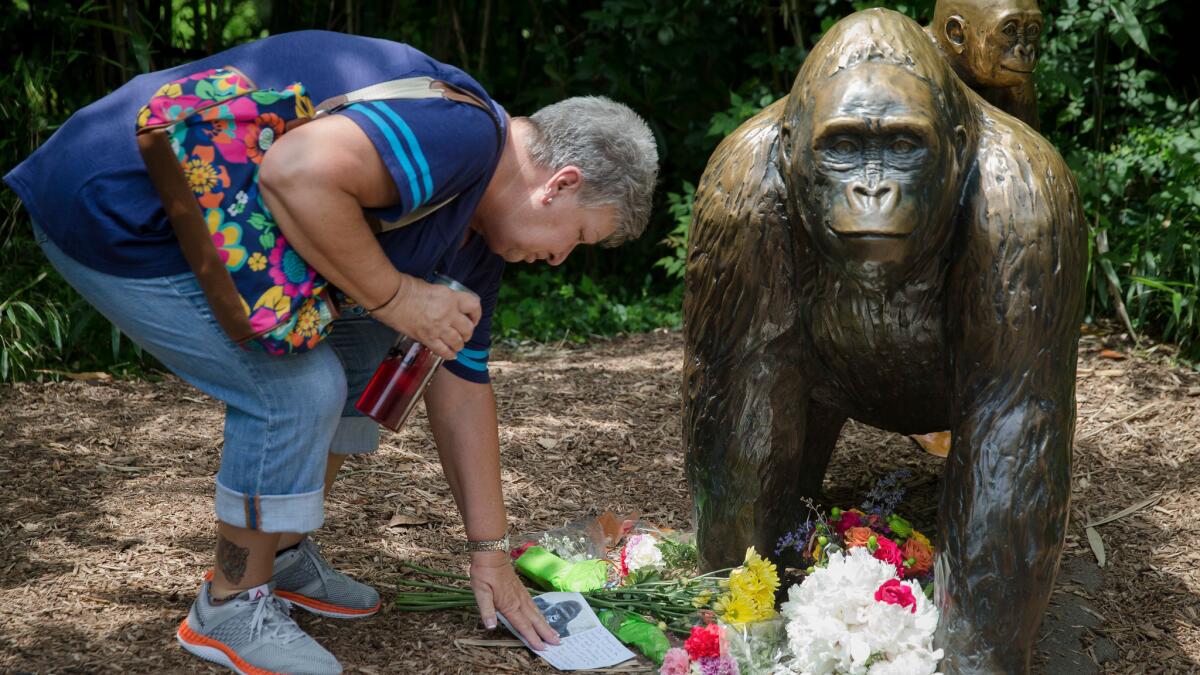Op-Ed: Harambe the gorilla dies, meat-eaters grieve

Last weekend at the Cincinnati Zoo, a child got curious and a gorilla got shot. The 4-year-old boy crawled past a barricade and fell into a moat surrounding the enclosure housing Harambe, whose 17th birthday had been celebrated the day before. In the 10 minutes the two spent together, Harambe showed no intention of harming the boy, but he did drag him around the moat by the leg, with a speed and force that could have drowned him or cracked his skull.
Zoo officials chose to shoot Harambe as the only way to guarantee the child’s safety. Darting Harambe with a tranquilizer gun was judged too risky as the drugs don’t take immediate effect; the act might have enraged the gorilla before sedating him.
Public reaction has been varied. Some expressed fury at the zoo for shooting Harambe. Others argued “It’s a Gorilla; Get Over it,” as the title of one widely circulated column put it. We saw similar ambivalence over the killing of Cecil the lion and Marius, the “surplus” giraffe at the Copenhagen Zoo. In the case of Harambe, some of the outrage came from people who feed animals to their own children, yet denounced a zoo for killing an animal who was a threat to another child’s life. Evidently our attitudes to animals are changing, but they remain confusing and contradictory, if not incoherent.
We see that confusion in the language we use to discuss animals. Even sympathetic coverage of Harambe’s death referred to him as “it” or “the gorilla that” as opposed to “the gorilla who,” an indication of his lower moral status. The New York Times first used “that” and then corrected the article online to read “who,” as that paper’s style manual advises the use of “who” if the animal has a name. That’s progress, of sorts, but a self-aware, sentient being is not a thing, like a chair or a rock, and our language should reflect that, without depending on whether we humans have chosen to give the animal a name.
In the statement released by the boy’s family, who were grateful for the quick action of the zoo and sorry for the grief they had caused, Harambe’s name was not used. Perhaps a family who considers a day looking at captive animals to be fun is unlikely to think of them as individual beings. In a Facebook post, the boy’s mother thanked God for having protected her child without even mentioning that anyone had died.
Some of those responding to the killing were eager to find someone to blame. As animal advocates, we don’t automatically deem the life of a boy as exponentially more important than that of a fellow primate, and we might have been inclined to risk the tranquilizer gun in order to save Harambe’s life. But we realize that is easy for us to say, given that it wasn’t our child being dragged by a 400-pound gorilla, so we are not eager to blame zoo officials for their choice.
The more we learn about other animals, the more it becomes clear that they differ from us, as Charles Darwin put it, in degree rather than kind.
What about the mother of the child? Many people on social media called for her to be charged. After all, if her child were rescued after she had left him in a hot car she would face consequences. Those calls seemed to be driven by grief over the loss of the gorilla rather than concern for the child’s welfare. Yet American hunters who kill magnificent animals in Africa are not charged, even when they subject us to photos of themselves smiling next to their macabre trophies.
One of the larger issues here is that we still confine animals for our entertainment. The death of SeaWorld trainer Dawn Branchau spawned the movie “Blackfish” and a public outcry, leading SeaWorld to end its orca breeding program – though it will continue keeping the whales in tanks. After years of bad press, Ringling Bros. abandoned its elephant acts. Perhaps the widespread sorrow around Harambe’s death will similarly encourage people to rethink putting animals on display so that we can gawk at them.
See the most-read stories this hour >>
Forty years ago the astronomer Carl Sagan, who led the search for extraterrestrial intelligence, pointed out that there is nonhuman intelligent life right here on Earth. After describing the abilities of great apes to solve problems that require abstract thinking, he then asked: “Why, exactly, all over the civilized world, in virtually every major city, are apes in prison?” Instead of roaming the jungles of Africa, Harambe was confined to an enclosure where he had few choices as to daily activities, food, sexual partners or social interactions with others of his species. He was a well-treated prisoner who had committed no crime.
People may argue that as natural habitats shrink we must put members of endangered species in protected areas for their own safety. Sanctuaries are surely necessary in some cases. Sanctuaries, however, are not zoos; they are focused on the interests of the animals, not just as members of protected species, but as individuals whose interests come first, including living in a group with strong familial bonds.
The more we learn about other animals, the more it becomes clear that they differ from us, as Charles Darwin put it, in degree rather than kind. They display intelligence and emotion. That’s true for giraffes, lions and gorillas as well as for animals commonly sliced up and put into sandwiches.
After studying pigs, Lori Marino, a neuroscientist at Emory University, found their intelligence to be comparable to that of elephants and even chimpanzees. If you Google “turkeys playing soccer” you will see three clearly sentient beings appearing to have a great time. Harambe, a Silverback, didn’t eat those animals. We don’t need to either, and it is now widely accepted that it would be far better for our planet if we didn’t.
That doesn’t mean the outpouring over Harambe’s death is misplaced. But those who feel grief might wish to examine it and think about situations that are less critical, where the choice to kill is less justifiable, whether it be for sport, fashion or just because people prefer the taste of one food over another. Instead of railing against those who killed Harambe, we can take his death as a spur to reconsider our attitudes to animals and our own participation in the needless deaths of so many of them.
Peter Singer is professor of bioethics at Princeton University, laureate professor at the University of Melbourne, and the co-founder of the Great Ape Project. His books include “Animal Liberation,” “Practical Ethics” and “The Most Good You Can Do.” Karen Dawn runs Dawnwatch.com and is the author of “Thanking the Monkey: Rethinking the Way We Treat Animals.”
MORE FROM OPINION
Legalizing marijuana is a hazy question once you’ve seen addiction up close
How to treat a drug-addicted doctor
It’s almost over! For now. Here are The Times’ endorsements
Follow the Opinion section on Twitter @latimesopinionand Facebook
More to Read
A cure for the common opinion
Get thought-provoking perspectives with our weekly newsletter.
You may occasionally receive promotional content from the Los Angeles Times.










